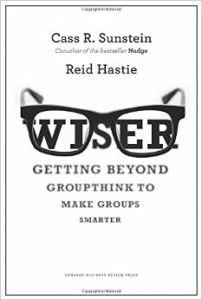Editor’s Note: From 2009 to 2012, Cass Sunstein served as administrator of the White House Office of Information and Regulatory Affairs (OIRA). OIRA helps to oversee federal rule-making in the areas of environmental protection, workplace safety, healthcare, immigration, agriculture, homeland security and more.
The following is an excerpt from Sunstein and Reid Hastie’s new book, Wiser: Getting Beyond Groupthink to Make Groups Smarter.
Whether the issue involves health care or immigration or clean air, federal policy is often made through rule making. Operating in groups, agencies try really hard to compile relevant information.
We have noted that the White House Office of Information and Regulatory Affairs (OIRA) sees much of its responsibility as one of assembling dispersed information, so as to increase the likelihood that the relevant group — people who work for the government itself — is wiser.
But let’s not celebrate too loudly. Public officials face a potentially serious problem — one that Friedrich
Hayek, the great 21st critic of socialism and economic planning, would certainly appreciate. Dedicated followers of Hayek call it the “knowledge problem.” Even if public officials are expert, diverse and well motivated, they may not know nearly enough. An air pollution regulation might have major effects on companies and on state and local governments all over the United States. The consequences of that regulation for Los Angeles, or for companies in Ohio and Utah and Michigan, might not be visible to regulators. The government may have terrific scientists (actually, it does), but there are a lot of scientists in the nation, and they often have information that government lacks.
What can public officials do to obtain what they need to know?
A Little Law and a Big Surprise
Within the federal government, the answer goes by the name of notice-and-comment rule-making. Through this process, federal agencies send out proposed rules for notice and public comment and give people a reasonable period (at least 60 days) to comment. The rules might involve homeland security, air pollution, immigration, or food safety. Among professors of administrative law, there is a widespread cliché — let’s call it the sophisticated view — to the effect that the comment process is a fraud, a charade, a form of kabuki theater. In the sophisticated view, the real work is done behind the scenes. When the proposed rule is presented to the public, it is essentially baked.
As Sunstein learned during his time in government, the sophisticated view turns out to be entirely wrong. On the contrary, the comment period greatly matters, and federal agencies take people’s suggestions and concerns seriously. Such agencies do so for one reason above all: people have information that officials lack, and to get the rules right, officials need to take that information into account. Time and again, proposed rules are changed and significantly improved because of what various members of the public say in comments.
Sometimes the rules are clarified. Sometimes they are scaled back, because they would be too intrusive.
Sometimes they are redirected, because the redirection makes them much better.
Sometimes they are put on the back burner — and never appear again. The notice-and-comment approach is primarily a process of acquiring information, not of considering the threats of interest groups or playing politics.
Reprinted by permission of Harvard Business Review Press. Excerpted from Wiser: Getting Beyond Groupthink to Make Groups Smarter by Cass R. Sunstein and Reid Hastie. Copyright 2015. All rights reserved.




